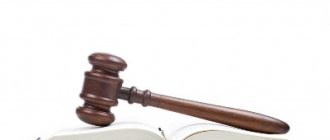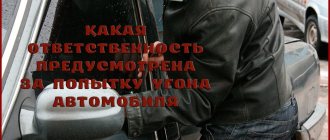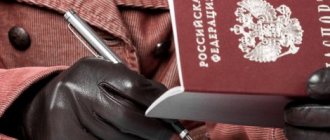ST 144 of the Criminal Code of the Russian Federation.
1. Obstructing the legitimate professional activities of journalists by forcing them to disseminate or refuse to disseminate information is punishable by a fine in the amount of up to eighty thousand rubles or in the amount of the wages or other income of the convicted person for a period of up to six months, or by compulsory labor for a term of up to three hundred and sixty hours, or correctional labor for up to one year.
2. The same act, committed by a person using his official position, is punishable by a fine in the amount of one hundred thousand to three hundred thousand rubles, or in the amount of the wages or other income of the convicted person for a period of one to two years, or by compulsory labor for a term of up to four hundred eighty hours, or correctional labor for a term of up to two years, or forced labor for a term of up to two years with deprivation of the right to hold certain positions or engage in certain activities for a term of up to three years or without it, or imprisonment for a term of up to two years with deprivation the right to hold certain positions or engage in certain activities for a period of up to three years or without it.
3. Acts provided for in parts one or two of this article, coupled with violence against a journalist or his relatives or with damage or destruction of their property, as well as the threat of using such violence, are punishable by forced labor for up to five years or imprisonment for a term up to six years with or without deprivation of the right to hold certain positions or engage in certain activities for a period of up to three years.
Journalist's work
First we need to consider what exactly the activities of professionals are. Here the regulatory document is Federal Law No. 2124-1. is where the rights granted to media employees are described:
- Make recordings using any technical means. Exceptions are made only for situations that are precisely described by law.
- Gaining access to materials and documents that may constitute various types of secrets.
- Search and requests for information, its distribution and receipt.
The list is not exhaustive; there are 12 parts in total. There are other laws that protect the rights of citizens. The Constitution further describes information that must be absolutely free.
Free legal consultation
+8 800 100-61-94
What is the obstacle?
According to Article 144 of the Criminal Code of the Russian Federation, this is one of the types of criminal acts. An example of such actions is when journalists are forced to disseminate any information, or are forced to refuse to do such work.
The order of professional activities of journalists in this case becomes the main object of crime. The law lists a wide range of actions that are considered violations in this area. But it is criminal liability that is provided for forcing specialists to distribute, or refusing to agree to certain requirements.
A person with the appropriate professional status will be recognized as a victim:
- Staff members who collect information for various media outlets. Moreover, the products are distributed exclusively within one enterprise.
- Authors who are recognized as freelancers may receive any assignments from the administration.
Attention! Responsibility increases for those who use their official position to commit a crime.
Commentary to Art. 144 Criminal Code
1. The objective side is characterized by an action in the form of obstructing the legitimate professional activities of a journalist in one of two ways specified in the law: a) through illegal coercion (in any form of physical or mental pressure, including the threat of violence, destruction or damage to property, blackmail) to disseminate information or b) through illegal coercion (in any form of physical or mental pressure, including threats of violence, destruction or damage to property, blackmail) to refuse to disseminate information. The object of influence in this case can be both the journalist himself and his relatives.
2. The crime is completed from the moment of committing actions to impede the legitimate professional activities of a journalist, regardless of their actual success.
3. Parts 2 and 3 provide for qualified and especially qualified offenses. Violence actually applied to a journalist or his relatives, resulting in the infliction of grievous harm to health, should be qualified in conjunction with Art. 111 CC; less serious types of harm to health are covered by Part 3 of the commented article.
What responsibilities are provided?
Article 144 of the law mentioned above says what exactly applies to obstruction of a journalist’s activities:
- No contact with media representatives.
- Unauthorized removal of material that was obtained legally.
- Impact on the work of journalists and the media.
- Application of censorship.
The minimum penalty is a fine of up to 80 thousand rubles. One salary may be applied. The source of collection may be other types of profit that citizens receive.
The subject of the crime will be any sane person who has reached the age of 16 years.
Not only physical, but also mental pressure can lead to negative results.
From 100 to 300 thousand is the amount of fines for those who took advantage of their official position to commit a crime. Correctional or compulsory labor is also applied to such violators. The maximum punishment includes imprisonment for a certain period of time and complete suspension of activities.
Obstruction of the legitimate professional activities of journalists (Article 144 of the Criminal Code of the Russian Federation).
Direct object
This crime is freedom of the press and other media.
Objective side
The crime is characterized by obstruction of the legitimate professional activities of a journalist. The method of obstruction is coercion. It can be expressed in mental and physical violence, blackmail, the threat of destruction of property of both the journalist and other persons whose fate is not indifferent to the victim.
The corpus delicti of this crime is formal and ends from the moment the actions aimed at impeding the legitimate professional activities of the journalist begin.
Subjective side
crime is characterized by a deliberate form of guilt in the form of direct intent.
Subject
general crime, i.e. a natural, sane person who has reached the age of 16 years.
In Part 2 of Art. 144 of the Criminal Code of the Russian Federation provides a qualifying feature: committing a crime using one’s official position.
In Part 3 of Art. 144 of the Criminal Code of the Russian Federation provides a special qualifying feature: the commission of a crime with the use of violence against a journalist or his relatives or with damage or destruction of their property, as well as with the threat of using such violence.
Obstructing the holding of an assembly, rally, demonstration, procession, picketing or participation in them (Article 149 of the Criminal Code of the Russian Federation).
Direct object
This crime is the right of citizens to assemble peacefully, without weapons, to hold meetings, rallies, demonstrations, processions, picketing.
Objective side
This crime includes three alternative acts:
1) illegal obstruction of a meeting, rally, demonstration, procession, picketing (for example, illegal prohibition of their holding);
2) illegal obstruction of participation in them (the person was not allowed to attend the meeting or was removed from it);
3) coercion to participate in them.
A method of preventing the conduct of these public actions, participation in them, or coercion to participate in them can be either the use of violence or the threat of its use, or the use of one’s official position by an official.
The corpus delicti is formal and ends from the moment of commission of the acts specified in the disposition of Art. 149 of the Criminal Code of the Russian Federation.
Subjective side
crime is characterized by a deliberate form of guilt in the form of direct intent.
Subject
This crime can be either general or special.
AT 3. Crimes against social rights and freedoms of man and citizen.
The system of crimes against the socio-economic rights and freedoms of man and citizen is formed by the following criminal acts:
1) violation of labor protection rules (Article 143 of the Criminal Code of the Russian Federation);
2) unjustified refusal to hire or unjustified dismissal of a pregnant woman or a woman with children under three years of age (Article 145 of the Criminal Code of the Russian Federation);
3) non-payment of wages, pensions, scholarships, benefits and other payments (Article 145.1 of the Criminal Code of the Russian Federation);
4) violation of copyright and related rights (Article 146 of the Criminal Code of the Russian Federation).
Violation of labor protection rules (Article 143 of the Criminal Code of the Russian Federation).
Direct object
This crime is the constitutional right of citizens to work in conditions that meet safety and hygiene requirements.
An additional object
is human health and life.
Objective side
a crime is characterized by three mandatory features:
1) an act in the form of action or inaction related to violation of safety rules or other labor protection rules;
2) a consequence in the form of serious harm to health or death of the employee;
3) the presence of a cause-and-effect relationship between the consequences that occurred and the act committed.
According to the design of the objective side, the composition
This crime is material and is considered completed from the moment the consequences occur in the form of serious harm to health or death of a person.
Subjective side
crime is characterized by a careless form of guilt in the form of frivolity or negligence.
Subject
special crime: a person who had the responsibility to comply with safety regulations and other labor protection rules.
On judicial practice in cases of violations of labor protection and safety rules during mining, construction or other work, see Resolution of the Plenum of the Supreme Court of the Russian Federation of April 23, 1991 No. 1.
Unreasonable refusal to hire or unjustified dismissal of a pregnant woman or a woman with children under three years of age (Article 145 of the Criminal Code of the Russian Federation).
Direct object
This crime is the constitutional right of everyone to freely use their abilities to work, choose their type of activity and profession, as well as the equality in rights and freedoms of women and men guaranteed by the Constitution of the Russian Federation and equality in opportunities for their implementation.
Objective side
This crime is characterized by two alternative acts:
1) unjustified refusal to hire;
2) unjustified dismissal.
According to the design of the objective side, the composition
of this crime is formal, i.e. the crime is considered completed from the moment of commission of any of the above acts.
Subjective side
crime is characterized by a deliberate form of guilt in the form of direct intent. The motive for the crime is related to the fact that the woman is pregnant or has a three-year-old child.
Subject
special crime: a person who has the right to hire and dismiss from work.
Direct object
This crime is freedom of the press and other media.
Objective side
The crime is characterized by obstruction of the legitimate professional activities of a journalist. The method of obstruction is coercion. It can be expressed in mental and physical violence, blackmail, the threat of destruction of property of both the journalist and other persons whose fate is not indifferent to the victim.
The corpus delicti of this crime is formal and ends from the moment the actions aimed at impeding the legitimate professional activities of the journalist begin.
Subjective side
crime is characterized by a deliberate form of guilt in the form of direct intent.
Subject
general crime, i.e. a natural, sane person who has reached the age of 16 years.
In Part 2 of Art. 144 of the Criminal Code of the Russian Federation provides a qualifying feature: committing a crime using one’s official position.
In Part 3 of Art. 144 of the Criminal Code of the Russian Federation provides a special qualifying feature: the commission of a crime with the use of violence against a journalist or his relatives or with damage or destruction of their property, as well as with the threat of using such violence.
Obstructing the holding of an assembly, rally, demonstration, procession, picketing or participation in them (Article 149 of the Criminal Code of the Russian Federation).
Direct object
This crime is the right of citizens to assemble peacefully, without weapons, to hold meetings, rallies, demonstrations, processions, picketing.
Objective side
This crime includes three alternative acts:
1) illegal obstruction of a meeting, rally, demonstration, procession, picketing (for example, illegal prohibition of their holding);
2) illegal obstruction of participation in them (the person was not allowed to attend the meeting or was removed from it);
3) coercion to participate in them.
A method of preventing the conduct of these public actions, participation in them, or coercion to participate in them can be either the use of violence or the threat of its use, or the use of one’s official position by an official.
The corpus delicti is formal and ends from the moment of commission of the acts specified in the disposition of Art. 149 of the Criminal Code of the Russian Federation.
Subjective side
crime is characterized by a deliberate form of guilt in the form of direct intent.
Subject
This crime can be either general or special.
AT 3. Crimes against social rights and freedoms of man and citizen.
The system of crimes against the socio-economic rights and freedoms of man and citizen is formed by the following criminal acts:
1) violation of labor protection rules (Article 143 of the Criminal Code of the Russian Federation);
2) unjustified refusal to hire or unjustified dismissal of a pregnant woman or a woman with children under three years of age (Article 145 of the Criminal Code of the Russian Federation);
3) non-payment of wages, pensions, scholarships, benefits and other payments (Article 145.1 of the Criminal Code of the Russian Federation);
4) violation of copyright and related rights (Article 146 of the Criminal Code of the Russian Federation).
Violation of labor protection rules (Article 143 of the Criminal Code of the Russian Federation).
Direct object
This crime is the constitutional right of citizens to work in conditions that meet safety and hygiene requirements.
An additional object
is human health and life.
Objective side
a crime is characterized by three mandatory features:
1) an act in the form of action or inaction related to violation of safety rules or other labor protection rules;
2) a consequence in the form of serious harm to health or death of the employee;
3) the presence of a cause-and-effect relationship between the consequences that occurred and the act committed.
According to the design of the objective side, the composition
This crime is material and is considered completed from the moment the consequences occur in the form of serious harm to health or death of a person.
Subjective side
crime is characterized by a careless form of guilt in the form of frivolity or negligence.
Subject
special crime: a person who had the responsibility to comply with safety regulations and other labor protection rules.
On judicial practice in cases of violations of labor protection and safety rules during mining, construction or other work, see Resolution of the Plenum of the Supreme Court of the Russian Federation of April 23, 1991 No. 1.
Unreasonable refusal to hire or unjustified dismissal of a pregnant woman or a woman with children under three years of age (Article 145 of the Criminal Code of the Russian Federation).
Direct object
This crime is the constitutional right of everyone to freely use their abilities to work, choose their type of activity and profession, as well as the equality in rights and freedoms of women and men guaranteed by the Constitution of the Russian Federation and equality in opportunities for their implementation.
Objective side
This crime is characterized by two alternative acts:
1) unjustified refusal to hire;
2) unjustified dismissal.
According to the design of the objective side, the composition
of this crime is formal, i.e. the crime is considered completed from the moment of commission of any of the above acts.
Subjective side
crime is characterized by a deliberate form of guilt in the form of direct intent. The motive for the crime is related to the fact that the woman is pregnant or has a three-year-old child.
Subject
special crime: a person who has the right to hire and dismiss from work.
Real cases of restrictions on the activities of a journalist
For example, a citizen worked for a major newspaper. He was involved in investigations into events involving criminal violations and consequences.
The citizen received information that a high-ranking official from the city’s administrative apparatus was involved in one of the crimes, along with several large businessmen. The data was provided by an unknown person who prematurely announced possible consequences. One of the businessmen found out about this himself and then called.
During the conversation, the consequences of publishing information that became known were mentioned several times. There were no direct threats or hints of them. The employee deleted the information and then contacted his colleague. As a result, he initiated the appeal to the court.
There is one more situation. One citizen received an anonymous letter with serious information. I decided to consult with a representative of the administration of the newspaper where he worked. As his immediate supervisor, the second person ordered that the investigation remain incomplete. And he threatened that otherwise he would have to file a letter of resignation. Or the same procedure will be organized compulsorily.
In the latter situation, the manager himself created obstacles to further work.
What else needs to be taken into account when working like this?
The following information should definitely be absent from journalists’ publications:
- If the citizen provided them with the condition that everything will be kept secret.
- Includes instructions for making explosives.
- About personal life, if the owner of the information did not give consent.
- Concerning minors who were victims of illegal actions.
- With a description of the method of producing drugs.
- Propaganda of obscene language and cruelty and violence.
- Disclosure of any secret that is protected by the state.
It is worth considering that the court does not always make the optimal decision based on the information received.
Often decisions of higher authorities involve not only the publication of refutations, but also the payment of additional compensation to the victims. Therefore, the decision to appeal to the European Court of Human Rights will become relevant.
Additional recommendations
The interpretation of some issues related to the activities of the media may differ depending on the specific case and other similar circumstances.
However, there is still no single concept that would be directly related to the object of the crime. The qualifying criteria for violations are not spelled out clearly enough, which is why problems arise. There are also not enough judicial precedents yet. But there is one general trend that stands out in this case.
Because of it, it is easy to come to the conclusion that the main target for violations is freedom of the press and other media. An additional object includes the rights with the interests of each individual journalist. This is an optional feature that legislators use to highlight specific properties inherent in a crime.
A wide range of social relations is covered by the concept of freedom of the press and other media. This ensures the legal activities of not only the journalists themselves, but also other specialists:
- Founders.
- Editorial representatives.
- Publishers.
- Distributors.
The direct object of the crime is one of the most important elements. It is worth noting that the absence of at least one of certain signs in a person’s actions leads to the fact that the crime is not recorded. Because of this, in reality, entire segments of actions are omitted from actions, leading to a decrease in responsibility, although in reality illegal actions are committed.
It is necessary to organize civil proceedings in order to at least partially compensate for the damage caused. Criminal liability is associated with other grounds. But in this case it is easier to isolate the composition, and fewer problems arise with the formulation of characteristics.
External manifestation in objective activity is the external side of the crime. Moreover, each of the participants can have both objective and subjective ideas about what is happening. In many cases, the significant fact is the act itself, and not the perception of it by other participants.
Almost every phenomenon has both a positive and a negative side. When qualifying a crime, courts do not take into account the consequences of each action and some aspects related specifically to the objective side.
Important! Another important sign is the method of committing the crime. Article 144 of the Criminal Code of the Russian Federation describes only one of the possible methods - influence and coercion. But there is no specification regarding what coercion is. There is still no consensus on the forms in which it should be expressed. Sometimes statements are not only contradictory, but also mutually exclusive.
Regarding comments to the law, there is no concept of a “valid, ineffective version”. Only the words “changed, supplemented and obsolete” can be used as a description. However, it is often impossible to tell which of the comments comes out earlier and which later. If we also take into account the fact that the comments themselves can be in printed or electronic form.
If we pay attention to the passes and certificates of journalists, then on almost each of them we can find the following inscription: “Obstruction of the legitimate professional activities of journalists is punishable by law (Article 144 of the Criminal Code of the Russian Federation).” But, unfortunately, few journalists know who and for what specific actions can be prosecuted under this offense. This work is addressed primarily to journalists and is dedicated specifically to an explanation of Art. 144 of the Criminal Code of the Russian Federation (hereinafter referred to as the Criminal Code).
According to Art. 29 of the Constitution of the Russian Federation “... everyone has the right to freely seek, receive, transmit, produce and disseminate information in any legal way. The list of information constituting a state secret is determined by federal law. Freedom of the media is guaranteed. Censorship is prohibited." The content of Part 4 of Article 29 of the Constitution of the Russian Federation is inextricably linked with the implementation of freedom of thought and speech. Guaranteed freedom of information is implemented in various ways: orally, in writing, through the media and other legal means. The most common way of searching, receiving, transmitting, producing and distributing information is the media, which in accordance with the Law “On the Mass Media” (hereinafter referred to as the Federal Law “On the Mass Media”) means periodicals, radio, television, and video programs , newsreels, other forms of periodic dissemination of mass information.
Dissemination of information by legal
ways requires compliance with certain restrictions on access to information classified as state secrets or confidential. The Law of the Russian Federation of July 21, 1993 “On State Secrets” establishes information classified as state secrets, the procedure for classifying and declassifying information and its carriers, disposing of this information, as well as the protection of state secrets. Officials and citizens guilty of violating the legislation on state secrets bear criminal, administrative, civil or disciplinary liability in accordance with current legislation.
The Law “On State Secrets” simultaneously establishes a list of information that is not subject to classification
: about emergencies and disasters that threaten the safety and health of citizens and their consequences, about natural disasters, their official forecasts and consequences; about the state of ecology, health care, sanitation, demography, education, culture, agriculture, as well as the state of crime; about facts of violation of human and civil rights and freedoms, etc.
The Federal Law “On the Mass Media” and “On Information, Informatization and Protection of Information” prohibits the dissemination of confidential information relating to private life, violating personal or family secrets, or information constituting a commercial or other secret protected by law.
The freedom of thought and speech proclaimed by the Constitution is guaranteed by freedom of the media and the prohibition of censorship. The Federal Law “On the Mass Media” establishes that the search, receipt, production and dissemination of mass information, the establishment of mass media, ownership, use and disposal of them, the manufacture, acquisition, storage and operation of technical devices and equipment, raw materials and materials intended for production and distribution of media products is not subject to restrictions. An exception can only be provided for by federal law. The Federal Law “On the Mass Media” determines the obstruction in any form of the legitimate activities of the media by citizens, officials, government bodies, public organizations through the establishment of censorship, interference in the activities and violation of the professional independence of the editorial board, illegal termination or suspension of the activities of the media as a violation of freedom of media, which may entail liability, even criminal liability.
Infringement of freedom of the media can take various forms
, the main ones are listed in Art. 58 Federal Law “On the Mass Media”: implementation of censorship; interference in the activities and violation of the professional independence of the editorial board; illegal termination of the activities of a mass media outlet; forcing a journalist to disseminate or refuse to disseminate information, etc.
Administrative and criminal legislation provides for the specification of these provisions, however, legal liability for an infringement on freedom of the media as an independent offense is established only by Art. 144 of the Criminal Code.
The need to establish liability for obstructing the legitimate professional activities of journalists was discussed at the European Seminar on Strengthening Independent and Pluralistic Media, organized in Sofia (Bulgaria) from 10 to 13 September 1997 by the United Nations Department of Public Information (UNDPI) and the UN Education, science and culture (UNESCO). It, in particular, noted that journalists in a number of cases are victims of persecution, physical violence, threats, torture, abductions, murders, etc. And this is despite Art. 19 of the Universal Declaration of Human Rights and Resolution 45/76 A of the UN General Assembly of 14 December 1946, which states that freedom of information is a fundamental human right.
In a statement by the Russian Commissioner for World Press Freedom Day (May 3, 2002), it was emphasized that the events taking place around some media outlets showed difficulties in the relationship between the authorities and the media. Journalists are under more than just economic pressure. They are persecuted and threatened. In the regions, there were seizures and arrests of newspaper circulation, and blackouts, and this was often done demonstratively, with the involvement of law enforcement agencies - riot police and the Regional Directorate for Organized Crime Control. The struggle for influence on the press, radio, and television becomes especially acute during election campaigns. At the same time, it is necessary to resolve the issue of the inadmissibility of propaganda of violence, pornography, and drunkenness on state and private television channels. It is advisable to amend the law on media.
The need to protect the media was also mentioned in the reports of the Commissioner for Human Rights in the Sverdlovsk Region. Participants in the meeting, organized on October 28 by the Glasnost Defense Foundation with the assistance of the foundation’s partners in the region, came to the conclusion that the region’s law enforcement agencies are not zealous in investigating and solving crimes against journalists and the media. This was publicly stated by both the Commissioner for Human Rights and the head of the Sverdlovsk Creative Union of Journalists D.P. Polyanin, and the chairman of the regional branch of the Media Union O.A. Rakovich.
Corresponding statements about attacks on regional media workers were sent in the summer of 2004 to the Yekaterinburg City Internal Affairs Directorate. However, only in two cases of attacks on journalists were responses from the police leadership received. This was also discussed at the meeting of the President of the Glasnost Defense Foundation A.K. Simonova with the prosecutor of the Sverdlovsk region B.V. Kuznetsov.
According to the All-Russian Foundation for the Defense of Glasnost, in 2002, 9 attacks on media workers were registered in the Sverdlovsk region, in 2003 there were already fifteen. In terms of the number of attacks that occurred, Yekaterinburg was in second place after Moscow, where 16 such cases were registered. In 2004, 9 attacks on journalists were reported.
Obstructing the legitimate professional activities of journalists by forcing them to disseminate or refuse to disseminate information encroaches not only on the constitutional freedom to search, receive, transmit and disseminate information, but also on the conditions that ensure this freedom - the professional activity of a journalist.
Under information
in accordance with Art. 2, 12 of the Federal Law “On Information, Informatization and Information Protection” refers to information about persons, objects, facts, events, phenomena and processes, regardless of the form of their presentation. Current legislation distinguishes two types of information depending on the form of its existence: undocumented and documented (recorded on a tangible medium with details that allow it to be identified). In relation to the composition under consideration, any of these concepts is meant, since a journalist can transmit to the editorial office both the text of his report and a telephone message about events and facts.
The totality of documented information forms information resources
, which may belong to state authorities, local governments, private individuals and organizations. In accordance with the law, a journalist has the right to free access to government information resources and is not required to justify to the owners of these resources the need to obtain the information they request. An exception is information with limited access (Article 12 of the Federal Law “On Information, Informatization and Information Protection”).
Direct object
Art. 144 of the Criminal Code are social relations ensuring freedom of the press and other media. Infringement of freedom of the media, including obstruction of the legitimate activities of journalists, should entail criminal, administrative, disciplinary or other liability.
To the victims
when committing this crime is a journalist, i.e. a person engaged in collecting, editing, creating or preparing materials for the media, associated with them through labor or other contractual relations, or engaged in such activities under their authority. Obstructing the activities of a journalist by using violence or threats against him must be qualified under the totality of Art. 144 and art. 111 (Intentional infliction of grievous harm to health) or 112 (Intentional infliction of moderate harm to health) of the Criminal Code, depending on the severity of the violence or Art. 119 (Threat of murder or infliction of grievous bodily harm) of the Criminal Code.
From the objective (external, visible) side
crime under Art. 144, may occur in cases of obstruction of the legitimate professional activities of a journalist through coercion:
1) to disseminate information
And
2) to refuse to disseminate information
.
Obstructing the activities of a journalist involves, first of all, influencing both the journalist himself and those close to him, with the intention of preventing him from carrying out his legitimate professional activities. Obstruction of legitimate professional activities means deprivation of the opportunity to perform one’s professional duties and exercise the powers granted to one to collect information, as well as the creation of conditions that significantly impede professional activities. Professional activities are limited only to those areas related to the search or dissemination of information, as well as the performance of other functions of a journalist. Responsibility under Art. 144 of the Criminal Code occurs only in the event of obstruction of the legitimate professional activity of a journalist. Legal activities are those that do not violate the law, rights and freedoms of others. To resolve the issue of recognizing the activities of a journalist as legal, it is necessary to turn to the legislative acts regulating the activities of journalists and the media in general.
In accordance with the Law of the Russian Federation “On the Mass Media,” a journalist has the right:
1. search, request, receive and disseminate information;
2. visit government bodies and organizations, enterprises and institutions, bodies of public associations or their press services;
3. gain access to documents and materials, with the exception of their fragments containing information constituting state, commercial or other secrets specially protected by law;
4. make recordings, including using audio and video equipment, filming and photography, except for cases provided for by law;
5. visit specially protected places of natural disasters, accidents and catastrophes, riots and mass gatherings of citizens, as well as areas in which a state of emergency has been declared; attend rallies and demonstrations;
6. express his personal judgments and assessments in messages and materials intended for distribution under his signature;
7. refuse to prepare, under his signature, a message or material that contradicts his beliefs;
8. remove his signature from a message or material, the content of which, in his opinion, was distorted during the editorial preparation process, or prohibit or otherwise stipulate the conditions and nature of the use of this message or material (Article 47). A journalist is also endowed with other rights and responsibilities. Creating obstacles in the exercise of the rights and fulfillment of the duties of a journalist forms elements of a crime under Art. 144 of the Criminal Code. In Art. 144 of the Criminal Code, the legislator specifies that obstruction is carried out through coercion.
Forcing a journalist to disseminate information
involves forceful influence on him or his loved ones in order to force him to disclose certain information against his will. The requirement to publish mandatory messages provided for by law is not considered unlawful coercion to disseminate information, for example, the editorial office is obliged to publish free of charge and within the prescribed period a court decision that has entered into legal force, containing a requirement to publish such a decision through a given mass media, Art. 35, 43 Federal Law “On the Mass Media”. The lawful demand of a citizen to editorial journalists to refute information that is untrue and discredits his honor and dignity, which was disseminated in this mass media, does not constitute coercion to disseminate information and does not fall under the criteria of the composition in question. The legal representatives of a citizen also have this right, if the citizen himself does not have the opportunity to demand a refutation.
Forcing a journalist to refuse to disseminate information
also consists of influencing a journalist or people close to him, but with the opposite goal - to force him to refuse to publish information known to him.
Coercion is usually carried out through physical or mental violence. Most often these are various kinds of threats. Giving advice to a journalist about the advisability or inexpediency of publishing specific materials in the absence of coercion does not entail criminal liability.
Current legislation provides for cases where a journalist’s right to receive information may be limited. Such a restriction based on the law cannot be considered as an obstacle to the activities of a journalist. In particular, preventing the publication of information that is prohibited by law from dissemination does not constitute a crime. So, in accordance with paragraph “b” of Part 1 of Art. 12 of the Federal Law of May 30, 2001 “On a State of Emergency” in a certain territory, by decree of the President of the Russian Federation, a restriction of freedom of the press and other media is introduced by introducing preliminary censorship, indicating the conditions and procedure for its implementation, as well as the temporary seizure or arrest of printed materials, radio broadcasts , sound-amplifying technical means, duplicating equipment, establishing a special procedure for accreditation of journalists. Restrictions on the freedom of dissemination of information are also possible during the declaration of martial law.
It is not a crime to prevent a journalist from abusing freedom of the press. To such abuses, according to Art. 4 of the Federal Law “On the Mass Media” covers the use of the media for the purpose of committing criminal acts, for disclosing information constituting state or other secrets specially protected by law, for carrying out extremist activities, as well as for distributing programs promoting pornography, the cult of violence and cruelty.
The crime under Art. 144 of the Criminal Code, is from the moment of influence on a journalist with the intention of forcing him to commit certain actions or inaction, regardless of whether the perpetrator has achieved the desired change in the professional activity of the journalist or not.
From the subjective (internal) side
This crime is committed only with direct intent. The culprit is aware that the actions resulting in obstruction of the legitimate professional activities of the journalist are socially dangerous, and wants to commit them. The purpose of such actions is to change the nature of the journalist’s activity, while motives do not affect qualifications. They can be personal (self-interest, envy, etc.), but they can also be of a political nature (for example, the desire to discredit a candidate for deputy).
Subject of the crime
(an individual who has committed a crime and is capable of incurring criminal liability in accordance with criminal law) - any sane individual who has reached the age of 16.
Part 2 Art. 144 of the Criminal Code provides for liability for obstructing the legitimate professional activities of a journalist by a person using his official position for this purpose.
At the same time, the presence of this characteristic may lead to qualification under the totality of Art. 144 and art. 285 of the Criminal Code (abuse of official powers) or 201 of the Criminal Code (abuse of powers) in the presence of a real totality.
In Part 2 of Art. 144 of the Criminal Code provides for liability for qualified obstruction of the legitimate professional activities of journalists. The legislator defines this act as a qualifying feature when it is committed by a person using his official position. Such a person may be an official, i.e. a person who permanently, temporarily or by special authority carries out the functions of a government representative or performs organizational, administrative, economic functions in state bodies, local governments, state and municipal institutions, as well as in the Armed Forces of the Russian Federation, other troops and military formations of the Russian Federation.
Subject of Part 2 of Art. 144 of the Criminal Code may also include persons holding government positions in the Russian Federation or constituent entities of the federation, as well as civil servants and employees of local government bodies who are not classified as officials (Article 285 of the Criminal Code).
The commission of the crime in question by an official using his official position is one of the forms of abuse of official powers, liability for which is provided for in Art. 285 CC. However, to qualify the act under Art. 285 of the Criminal Code, in contrast to Art. 144 of the Criminal Code is required to additionally establish the presence of consequences in the form of causing a significant violation of the rights and legitimate interests of citizens or organizations or legally protected interests of society and the state, as well as a special motive for committing a crime - selfish or other personal interest.
Kukushkin D.A., 2005






